Liu Chuang, born in 1978, Hubei Province, graduated from the Hubei Art Academy in 2001, is now living and working in Beijing.
In 2005, I opened a handcraft factory in Dongguan1 with
other partners. It shut down soon after one year. During that period, I spent a
lot of time wandering around the factories. Those factories mainly manufactured
computers, electronics, clothing and shoes. The workers came from every part of
China, mainly from villages and small cities. Their average age was about 20
and most of them were female. There were many book rental shops in the factory
districts. Most of the books in these stores were love stories2. The
rental fee for the books was quite cheap. It cost about 2 RMB (about 33 cents)
for deposit and 0.5 RMB (about 8 cents) per day for rent (or buy the book for 2
RMB and get a new one for 0.5 RMB after read) . Many workers would rent a book
after they get off work. These books were only half size of a regular book.
They were small enough to fit in the pocket and very portable. I was interested
in the characters and the history of these books in the beginning. Most of
these books were written in Mandarin by Taiwan or Hong Kong writers in 1980s
and 1990s. It was a golden age for Taiwan and Hong Kong and created new social
classes. These books met the cultural needs of these new social classes. As
contemporary China developed and the industrial revolution took hold, they were
imported to mainland China and soon attracted a much larger readership. They
are categorized as low-level literature. Rarely translated into other
languages, these books were mainly circulated within Mandarin speaking
countries. I had tried to translate one of the books to English, which was my
plan for the artist residency program at Gasworks. But I eventually gave up due
to the lack of time.
Several years later, I wanted to re-create this work. I
purchased all the books from a run-down book rental shop, about 700 in total.
When I looked through them, I found quite big amount of hand written notes on
the page margins. Some look like letter drafts, which are really internal
monologues. I guess those letter were never meant to be sent out. They were
just written to the next reader who would rent this book. Some look like
diaries, some are the addresses of their hometowns or just scribbles. Besides
these, there were some modern poems. But after reading them carefully, I think
they are not actual poems. They could be copied from some random phrases they
saw or written down some words on their minds. The words or phrases could be
from somewhere nearby them. It feels like fruit picking in the orchard. The
fruits were casually picked up and put into the baskets. I looked very closely
at these handwritings, quite a few of them are brilliant. Their command of the
language really surprises me. They were much better than the tedious fictions.
These anonymous readers were aroused by a secret desire to write. They invented
a space from the white margins of the pages. They wrote and read in these blank
spaces. The whole process is silent and in secret. The writings propelled the
micro economical business of book rentals. It turned the book rental stores
into a lower version of internet blogging. It was invented in a specific time
and was temporary. It lasted from1990 to 2010, the same time as the internet
was developing and popularized in China. By 2010, when smart phones became
popular, many these book rental stores were shut down. People started to
download books on cell phones, the same books that were in those closed book
stores.
By Liu Chuang
【Notes】:
1, Dongguan is located in the Pearl River Delta in South China, close to Hong Kong. It was one of the first few cities opened up in China. The city attracts many investors due to its cheap labor and low rent. It became the factory of the world during the last 20 years of the 21st century. Approximately 70% of global computer production comes from there. The workers are very young, mostly between 20-30 years old. They come from every part of China, mainly from villages and small cities.
2, Love story is an old type of Chinese novels, also called "Back Alley novels" or "Handsome and Beauty novels". The plot basically focuses on how to find an ideal spouse or keep a relationship. The origin can trace back to the love stories of Tang dynasty (A.D 618-907), and readers were mainly female. It gradually disappeared after Tang and Song dynasty. Then Chapter novel became the main stream literature and its readers were mainly male. Later during the 1920s, another type of literature called “Mandarin duck and butterfly school” got very popular, also part of the love story genre. Around 1949, many these writers left mainland China and went to Hong Kong or Taiwan because of the political change in China. Love story ceased in mainland China due to the political movement at that time. In 1980s and 1990s, Love story became popular in Taiwan and Hong Kong because of their economical growth. It was another peak time for Love story. In the end of 1990s, some love stories were featuring gay romance. But these were very rare, less than 1% of the novels. After 2000, the internet started to have a huge influence on the form of traditional literature. During this time, the center of love story writing shifted to mainland China. Many Chinese writers appeared. Love story began its internet era.
 For more information
For more information
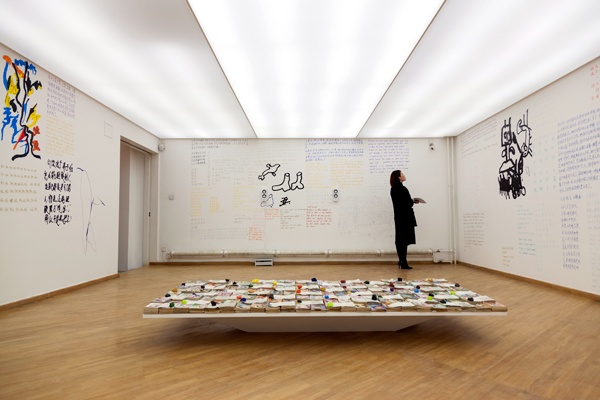 Exhibition installation
Exhibition installation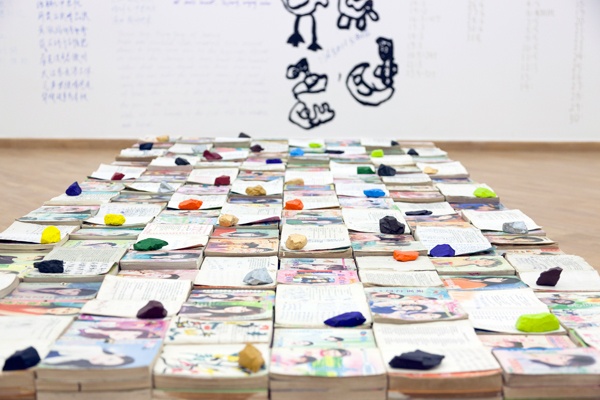 Exhibition installation
Exhibition installation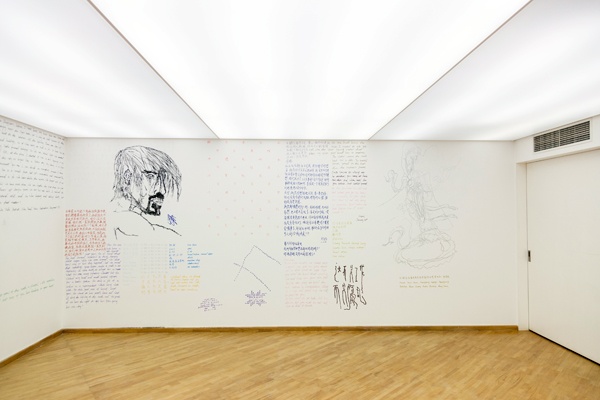 Exhibition installation
Exhibition installation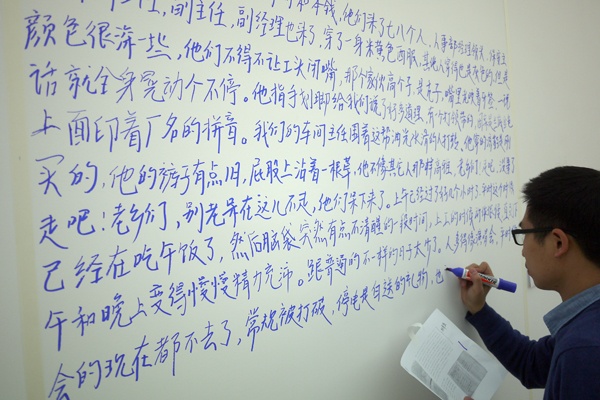 Artist Liu Chuang is working at Taikang Space, 2014
Artist Liu Chuang is working at Taikang Space, 2014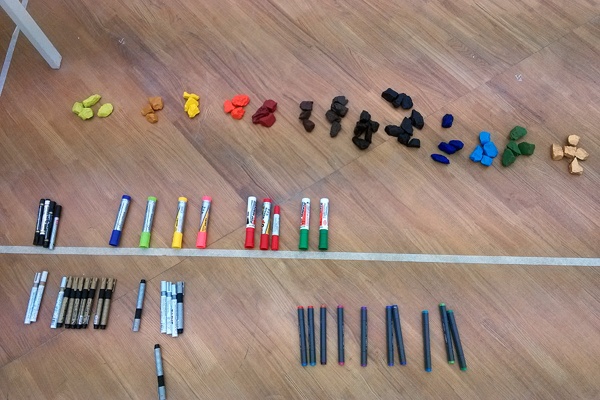 The pens used for installing the exhibition and the colored stones, 2014
The pens used for installing the exhibition and the colored stones, 2014





